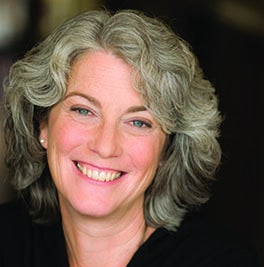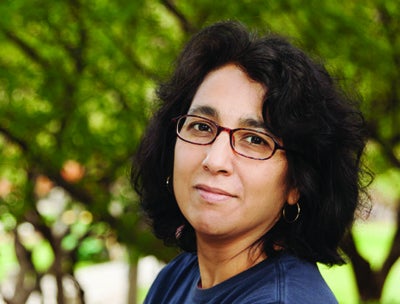The Aspen Words Writers in Residence program, held in partnership with the Catto Shaw Foundation, provides writers the opportunity to spend a month focused on their craft at a beautiful property in the Aspen area. Hosted by Isa Catto Shaw, an artist, and her husband, Daniel Shaw, a journalist, the program runs from spring through fall, with one author per month. While in residency, the authors engage with the community at free events at which they discuss their work and the writing life, and some residents visit a local school to speak with students. Beyond that, they’re free to use their time as they please. Here, four recent residents share the impact the program had on their writing.

Francisco Cantú
Every writer has their own practice, their own hard-fought ways of carving out time and space to write. I am one of the many writers who struggles to write at home: there have always been too many distractions, beckoning errands, and other goings-on to distract from the endless attempts to define some sort of domestic writing ritual. I was able to write my first book only by taking long escapes from the city and all the obligations that come with it. I sought solitude in a number of remote places at nature’s edge—my uncle’s often-vacant home in the Chihuahuan grasslands of New Mexico, a friend’s drafty cabin in Northern Arizona, and a tiny trailer hidden away in a remote corner of Piñon-juniper plateau country. It took many years, and many self-imposed retreats to these places for me to finally finish my book, The Line Becomes a River.
Something writers rarely talk about is the massive void that often follows a book’s publication. After all the touring, interviews, and book signings are finally done, first-time authors are faced with the need to reorient their time and think about new projects, undertake new reading and research, and somehow find a way of structuring new obligations into a life that is suddenly much busier than it was before. Underlying all of this is a fresh existential question: what does it mean to move through the world as a published author?
A monthlong residency in Aspen could mean many things for many different writers. There are opportunities for both solace and community, for outdoor adventures or quiet reading in pondside hammocks with commanding views of the Rockies. The joy of the Aspen Words residency is that writers are given ample time and encouragement to engage with their work in an environment that embraces both the joys and complexities of early authorhood. For emerging writers like me, the Aspen Words residency provides not only the time and space to write while hovering at nature’s edge but also the support of a thriving literary community eager to usher us out of the void and into the world.

Erica Bauermeister
Perhaps there is no greater gift you can give a writer than time and space—and an eight-foot-long table, just waiting for you to spread out all your notes and make a book. Add to that a host family (complete with dogs) that is warm and welcoming, and the staff at Aspen Words, which makes sure you don’t crawl into your mind and stay there. A community of artists and writers and readers. Leaves that turn a valley into gold. Snow that falls in the night and holds you close. Days of sunshine. A month—a whole glorious month—to write and write and write.
I arrived at the beginning of October 2017 with 250 index cards full of ideas, wanting to write a book that was part memoir, part architectural theory, the story of a renovation, and an exploration of how our houses change us. I spread the cards out on that table the first night and set to work. Each day, I would work until midafternoon and then walk the trails, letting my thoughts unfurl in all that space. I visited with extraordinary high-school students. I met with readers. I nestled in the deep chairs at the Hotel Jerome and wrote some more. Lunch with [local architect] Harry Teague set my mind spinning about all things architecture, and a visit to [Aspen Words’ supporter] Barbara Reese’s straw bale house, set in a grove of aspens, took theory and made it real.
I am, in general, a slow writer. If I can do 2,000 words in a week, I am ecstatic. During that month in Aspen, I planned a book, wrote a proposal, sold it, and completed 50,000 words in the final two weeks. It felt as if I had summited Everest, with wings. To say this experience was life-changing sounds momentous but in fact is an understatement. I had just come off a difficult three years. Coming to Aspen, having that month, was a blast of hope. A residency, in the end, is about more than time and space, important as they are. It is about support and connection. It is about community.

Geeta Kothari
A month to write! Alone! In the mountains! My residency in August 2018 sounded so fabulous, and it was—the space, the solitude, and the silence. Time passed differently in Aspen. I wrote, I read, and I stared out the window a lot. Some days, I lost all track of time and place until a sharp bark at the door (thank you, Luna) reminded me to hand over a treat.
I realized pretty early on that what I took away from the residency would be just as important as the time I spent there. When I took a break from writing, I read. I did yoga. I went for a walk. A friend compared the residency to a meditation retreat. I struggled with waves of resistance, boredom, and frustration; there were days where I felt like giving up. I became aware of my rhythm as a writer, the good and the bad days, and in my last week, a solution to an intractable problem revealed itself and I saw the road ahead very clearly.
When you leave home to write, the stakes are high. I worried so much that I wouldn’t use my time well that I barely left the apartment. I stayed off the internet as much as possible. My only purpose in Aspen was to write—everything else was secondary. Working at home after I returned to Pittsburgh, at the same desk where I read manuscripts, respond to student stories, and prep for class, I missed the intense focus I’d experienced in Aspen. Everything and nothing mattered. I wasn’t just having bad writing days. I was having no writing days.
Once you become aware of your own resistance, it’s hard to ignore it. Two weeks of struggling to work at home went by. I had to find a way to bring Aspen to Pittsburgh. A chance to join a coworking space with several other writers came up and I took it. This is the opposite of solitude, but this is a space that demands nothing of me. I show up with my computer and notebook, say hi to whoever’s there, and get to work. The view out the windows is of an old police station, a potholed parking lot, a McDonald’s. My only reason for being there is to write. And that’s what I do.

Chigozie Obioma
Writing is living in perpetual naivete. With each project, you become surprised by the new vistas that open up to you and by the fresh possibilities of experience that speak to you with unfamiliar eloquence. This was my experience when, at the end of 2016, I finished the first full draft of my novel An Orchestra of Minorities. I knew I needed a change of environment, to see something new to enhance my revisions. The Aspen residency was a real choice.
In Aspen, one is forced to be re-educated about the world. You become reacquainted with the varieties of nature and with the lushness of life. Things you’ve read about come to life. Although not given to much adventure, or too lazy to go anywhere adventurous, I have often hoped to encounter more wildlife in America by happenstance. In Aspen, I encountered my first snake and saw bears. These encounters helped me in no small measure as I wrote, daily, for hours at a stretch, two drafts of my new novel. Because the novel is set at various times, including 300 years back into postcolonial West Africa, the natural landscape in my imagination was enhanced just by looking out my window. I tapped into the powerful view of mountain ranges as I drew portraits of the Igbo cosmos.
But what I benefited from the most was the serenity. Almost never can I recall a place being more quiet. Sometimes in the evenings, as the cosmic space of the novel unfolded before my eyes and gods and creatures moved about on the pages of my book, I felt that I could hear the voices of the dead. It felt as though Aspen was at the border between the Earth and some sublunary world. One night, I awoke to the sound of something seeming to walk on the roof, and I realized that the window was open and the sound might actually be of some animal walking in the adjoining bush. I believe that it was these experiences, these ululations, this feeling of serenity that fed my revisions of Orchestra and continued to inspire me even long after my residency had ended.